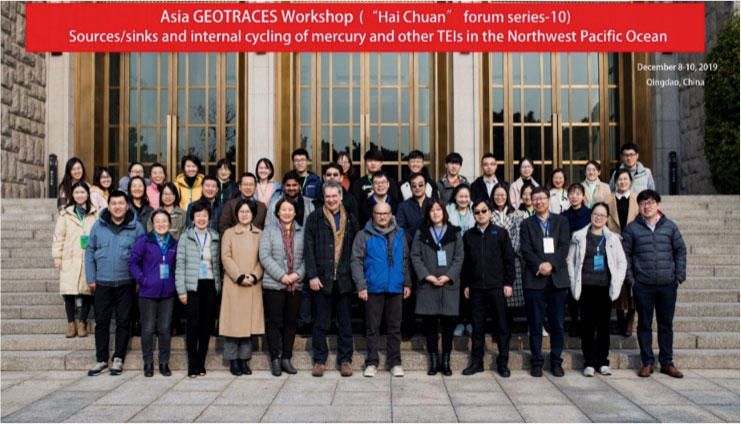Fourth Asia GEOTRACES Workshop
“Sources/sinks and internal cycling of mercury and other TEIs in the Northwest Pacific Ocean”
An Asia GEOTRACES Workshop: Sources/sinks and internal cycling of mercury and other TEIs in the Northwest Pacific Ocean, organized by Ocean University of China (OUC), was held during December 8-10, 2019, Qingdao, China. More than 50 participants from 9 countries, including China, Japan, Korea, India, Singapore, Canada, Germany, United States, and France (remote) attended the workshop. The aim of the workshop is to evaluate a full picture of the current status of the studies on the major sources/sinks and internal cycling processes of mercury and other TEIs in seawater in the Northwest Pacific Ocean (NWPO), and to generate a future regional collaboration and action plan for Asia GEOTRACES. During the workshop, two major topics were focused: 1) The distribution, speciation, sources, and internal cycling of mercury and its isotope in the NWPO; 2) TEls fluxes and processes at ocean interfaces, e.g. atmospheric deposition, sediment-water boundary, continental run-off as well as interaction between marginal seas and Kuroshio water. In addition to normal sessions, a student session was co-chaired by Profs. Greg Cutter and Eric Achterberg, 6 graduate students gave oral presentations. Moreover, the international inter-calibration for TEIs, particularly Hg were addressed, the discussed details include sample collection, storage, intercalibration, and data management. The capability of marine Hg analysis and study in the Asia is expected to be strengthened by the scientific exchange and communication during the workshop. Furthermore, some participants visited the new R/V “Dongfanghong III” (5,000 tons) and discussed the possible crossover stations with other international cruises (e.g. Germany and Japan) and the potential contribution for the international GEOTRACES collaboration, e.g., sharing cruise and performing inter-calibration in its near future cruise. Finally, per discussion, bio-GEOTRACES was considered one of the potential research fields. The future collaboration in research and possible joint grant applications were discussed and preliminary agreements were reached. The importance and possibility of regional collaboration to study marine pollution, e.g. mercury and lead were also emphasized.

